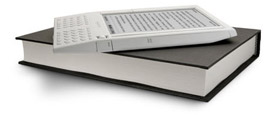 Several weeks have passed since the release of Amazon's new eBook reader, Kindle, and I am ready to explain to you why this hardware will fail and why it is the first step towards the eventual end of paper books.
Several weeks have passed since the release of Amazon's new eBook reader, Kindle, and I am ready to explain to you why this hardware will fail and why it is the first step towards the eventual end of paper books.
It's Still A Screen
Forget that it's ugly, because that doesn't matter too much. The biggest reason it will fail is that it does not replicate the experience of reading a book or magazine. From all I've read and seen, you are still reading on a super fancy, high contrast PDA. Chip Kidd put it best when he said, "People don't want to read books on a screen." I agree, but only because screens today suck.
This is where flexible screens come in. Right now in a lab somewhere, there is a painfully expensive piece of plastic that you can bend and will display video or still images. No matter what anyone tells you, this is not ready to use. As this 2004 BBC article notes, "eventually the displays are expected to be in colour". While no one knows exactly when, eventually there will be a flexible screen with contrast and resolution that comes incredibly close to paper. Remember digital cameras 10 years ago and the 600x480 photos they produced? Today we have 39 megapixel professional cameras and there will be a screen equally ridiculous ten years from now.
When flexible, 8"x10" color screens can run for a full day without a charge at 300dpi, then you'll hear paper books' death rattle. I want something that can approximate the experience of reading a broadsheet, a magazine and book while being able to play a video or song. Basically I want Harry Potter newspapers with sound.
Sharing is Good
The only other point of failure is Kindle's DRM. Dive Into Mark put it best, so I'll let you head there to find out the details, but I can't imagine not being able to lend my friend a book or magazine. Just like many of the music stores, if Amazon shuts of the service tomorrow your books are gone. The got the music store right, but they got this horrifically wrong.
The Rest Ain't Bad
The distribution method, the selection, the acquisition process and even paying for blogs are done well. Kindle makes reading books on a digital device very easy. They're just five to ten years too early.